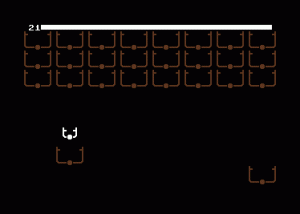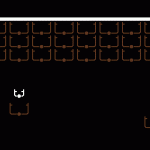
This is an unofficial conversion of a simple, yet addictive Nintendo game called "Crab Grab". You control a small man who must get rid of all the grabbers and try not to be caught yourself by the oncoming grabbers that come behind you.
Although a simple concept, the game is quite addictive and nicely created, even though the game is quite simplistic in its look, especially not looking far from a BASIC game. Well, thats because it IS a BASIC game, and a rather nicely made one… Very well programmed.
The game was never commercially released, and was never really intended for that reason. It seems that Pinocchio did this game as a joke/competition with a friend from school (Which you can read the full story about in Creator Speaks).
This game was not really for the whole world to see. A shame, as it’s a nice addictive game, and deserved at least a life in the PD games world. Peter Sanden helped get the game to the world, after Pinocchio passed on the title to Peter to extract the music. It was felt that it was a nice little game and deserved some spotlight, and so it has been added to the GTW archives.
So for the first time, you can get a glimpse of Pinocchio’s C64 work, and appreciate the nice feeling of this simple game.
Simple, but addictive… worth checking out!. Case closed…
Supporting content
Available downloads
- Game_Crabgrab.zip (zip)
Gallery
Creator speaks
Kurt Woloch speaks to GTW about work on Crab Grab...
"I wanted to comment on some things you wrote in your review of my game.
Firstly, the game itself was originally released by Nintendo as a LCD game in their Game & Watch series, I think it was in 1983 or 1984. The screen was a different format, and I tried to adapt it to the C-64's screen format. Actually, the original Nintendo game has 2 variations, Game A and Game B. I only adapted Game B, because that's what I liked better.
If you write that it's not far from a BASIC game, you're not far from correct... actually it WAS coded in BASIC, but I did some tricks to beef it up. First, I used Chris Hülsbeck's Sound Monitor to create the music and sound effects. Then I wrote a very short machine code routine which turns on an off the "LCD segments" by writing either the apprioriate color or black to the color RAM at the right place, so that the characters shown in the game appear and disappear promptly, which wouldn't have been possible using POKE commands. And lastly, at the end the whole program was compiled using the Austro-Comp compiler to make it run faster. But it's correct that I just used unaltered block graphics, and not a single sprite.
As for the release, well... there was some sort of an inside joke going on between me and a classmate, Michael Barthold (who's also mentioned in the title screen), about who of us would be the better programmer. He tried to do stuff on his Schneider CPC (identical to the Amstrad CPC in the UK), and once we held a competition about writing an adaptation of an LCD game. I think that's how it started... he tried his best at Mario Bros. (the double-screen game), but didn't get beyond the title screen (since he couldn't really do complex game logic). I also did a version of Mario Bros., the double-screen LCD game, but it didn't turn out as well as Crab Grab (it also didn't have any music). On the other side, I was always writing small programs, mostly in BASIC, since I got the TI-99/4A in early 1983. I think I must have done at least 30-50 simple games on the TI.
On the C-64, I didn't do that much because there already were much more games available for it. So the main purpose of the programs were firstly to learn programming (wich success - today I'm a programmer for Austria's government), and secondly to show my friends and classmates what I could do on the computer. Actually, I didn't dream of commercially releasing ANY game that I wrote... I figured that this would be up to "big companies". After all, during my C-64 time I collected over 200 disks full with commercial games, which I mostly copied from schoolmates and friends. So since I never bought one single game for the C-64, it didn't seem logical to commercially release a game for myself. At that time I was about 15 years old and still going to school, so my possibilities in this were also limited. Maybe you'll notice the lousy English in the instructions... my mother language is German, and I just didn't know how to put things better at that time.
But nevertheless, I intensively playtested all the games I did, and though they were simple, I tried to make them as bug-free and challenging as possible... not too easy, not too hard and always with a smoothly increasing grade of difficulty... at least is the projects made it to a halfway playable state. I'm pleased to see that you also found it addictive.
Actually, I did the game in two parts. I remember quickly losing interest in projects after I worked on them for some time. In this case, I created the title screen and the instructions with the fancy enlarged font, and maybe the title music too, and then forgot about the project for a few months. Then I re-discovered it and figured that now that all the framework was already done, I only needed to write the actual game anymore, so I jumped right on into this.
As I said, I primarily sent this out for the music. I wanted to do some title tune (and this is probably the best part of the game, quality-wise) that Michael would like too. Now there are some similarities about the musical taste of me and my family, and some relatives, and Michael also seemed to like most of that music. Basically, our common musical taste consisted of artists like Jean Michael Jarre, ELO, Boney M. and ABBA. So first I chose to do an ABBA song for this game (which is a bit unusual in style if you look at other C-64 music out at that time), and sorted through a tape of ABBA hits, trying to figure out which of the songs would best be suited for a C-64 version. I ended up doing "Knowing me, knowing you", and I think it turned out quite nicely. Some months later I showed the program to my cousins in Laxenburg who are also ABBA fans, and they did recognize the song by the melody, so I knew I'd done a good job at adapting it.
So that's what I have to say about that program I did, Crab Grab.
With greetings from Austria"
Kurt Woloch.


